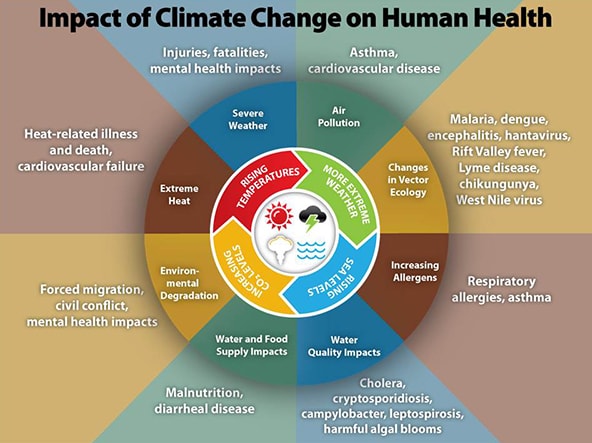Climate change is expected to have some wide ranging impacts we don't think of immediately, but could have some very immediate and personal implications for each of us.
Climate change is not only about severe storms, debilitating droughts, and other extreme weather events. It is a shifting of climates over the longer term, so that areas that were once prone to annual freezing have milder winters, or some areas that were once dry are more humid. Initially that does not sound bad at all, especially in the middle of winter storm season in the US.
However, this can also mean that disease prevalence can shift as climatic conditions for critters that carry the diseases also shifts. This means that species of ticks and mosquitos that normally could not survive (or thrive) in some areas are now becoming more established in the US. This is know as "changes in vector ecology".
 |
| http://www.cdc.gov/climateandhealth/effects/ |
The US Centers for Disease Control (CDC), UN World Health Organization (WHO), and now many universities, research centers, and others are increasingly confident about the direct impacts these changes in climate will have on human populations. Being scientists, they often do not draw immediate cause and effect relationships because of many variables that can impact human health. However, the evidence that climate change shifts the vector ecology is becoming more convincing.
Most recently, the Zika virus has surfaced in Brazil and Latin America, spread mainly by mosquitoes, and is having tragic impacts on families. Thousands of babies born in Zika affected regions have the birth defect microcephaly. The exact link of microcephaly to the Zika virus is not 100% certain yet, but the impact of the potential linkage on health care workers, family members and pregnant women, the media and general public is growing daily.
While the Zika virus has been around since 1947, the spread and the linkage to birth defects is growing rapidly. The symptoms of the virus are minimal. Any symptoms that occur can be easily mistaken or overlooked when someone is infected. According to recent news reports, roughly 500,000 - 1,500,000 cases of the Zika virus infectious outbreak have occurred in Brazil. And it is spreading very quickly.
We know it exists. We know it is spread by mosquitoes. The current spread of the disease shows us that the infection, and impacts are increasingly serious.
 |
Source: Centers for Disease Control and Prevention, Pan American Health Organization
Credit: Alyson Hurt/NPR For a detailed report on the history of the spread of Zika please visit NPRs "Goats and Soda"
|
With winter firmly upon us, most in the US are not too worried about mosquito borne viruses. Yet soon it will start to warm up, and mosquitoes will be our outdoor companions once again. And for those of us who are having milder winters today, we might have more close encounters with these little blood suckers, and their diseases, than we used to. Thanks to climate change.
So what can we do? How can we adapt?
To start with the US CDC has some great immediate recommendations at: http://www.cdc.gov/zika/index.html, including these nifty informational posters:
 |
| http://www.cdc.gov/zika/fs-posters/index.html |
While the particular species of mosquitoes that spread this virus are not prevalent across all of the US, the established populations are prone to spread as climate change continues to march forward.
And we have to adapt.
We also have to recognize that humans, as a species are also vectors for diseases and illnesses that we carry as we zoom around the planet. But more on that another day...

For additional reports see:
ReplyDeletehttp://www.theguardian.com/world/2016/feb/11/climate-change-zika-virus-south-central-america-mosquitos